#elmina castle
Explore tagged Tumblr posts
Text
Where was Columbus in 1482?
2 notes
·
View notes
Text
First edition of Lemon Freedom Bar & Grill's "FUFU EATING CHAMPIONSHIP" comes off on January 28
New Post has been published on https://plugzafrica.com/first-edition-of-lemon-freedom-bar-grills-fufu-eating-championship-comes-off-on-january-28/
First edition of Lemon Freedom Bar & Grill's "FUFU EATING CHAMPIONSHIP" comes off on January 28
In the heart of Africa, where the aroma of gastronomic delights mingles with the anticipation of fierce culinary competition, the stage is set for the first edition of Lemon Freedom Bar and Grill‘s ” Fufu Eating Championship”.
This long-awaited event promises to be a feast for the senses, celebrating the artistry, innovation, and passion that defines Ghana’s best traditional food.
The “Fufu Eating Championship‘ is the first of it’s kind in the Central Region as it seeks to promote local dishes and engage the youth of Elmina and Cape Coast in a healthy food competition.
Check flyers below for more details:
0 notes
Text
XPLORALYA: HISTORICAL MONUMENTS & UNFORGETTABLE PLACES in GHANA
XPLORALYA: MONUMENTOS HISTÓRICOS & LUGARES INOLVIDABLES en GHANA Suleiman Abdallah Business Administration, Turismo & Viajes, Actor, Writer. Director Gral. GHANA La Agencia Mundial de Prensa. Prensa Especializada Ghana is a historic country with a deep-rooted culture and diverse natural attractions that place it in a privileged position on the Gulf of Guinea in West Africa, famous for its…
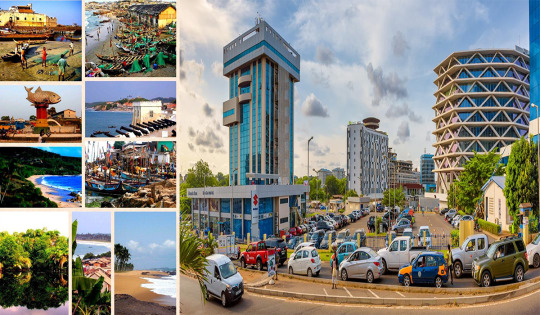
View On WordPress
#AFRICA#AKAA FALLS#BONWIRE KENTE WEAVING VILLAGE#DR. KWAME NKRUMAH MEMORIAL PARK AND MAUSOLEUM#ELMINA CASTLE#GBEWAA PALACE#GHANA#HISTORICAL MONUMENTS & UNFORGETTABLE PLACE IN GHANA#lomasleido#Suleiman Abdallah#THE LARABANGA MOSQUE#THE MOLE NATIONAL PARK#XPLORALYA
0 notes
Text


A year ago today on December 28, 2023 I was arrested for no reason. I was rushed by 12 cops and put in a cell with shit stained walls. I was given a court date and having done nothing my case was dismissed. I still do not feel I received justice. America is the worst.
A year later I have stood in the same dungeons my ancestors were held captive and tortured by our oppressors in Africa. One day we will officially be free, I promise.
#I was having a mental episode#my grandmother had fell that morning#the hood tried to pick a fight with me that afternoon#and the police provoked me that night#I only spent 3 minutes in front of the judge#such a fucking waste#fuck the police#fuck America#fuck the system#revolt revolt revolt#anarchy#anarchism#Elmina#Ghana#cape coast#slave dungeons#slave castle according to them#Africa
15 notes
·
View notes
Text

#travel#vacation#vacances#bon voyage#ghana#accra#kumasi#cape coast#solo travel#solo trip#family#family travel#new beginnings#elmina#castle#door of no return#love to see it#love to travel#beach#herstory#history#roots#findyourthing#find myself#group travel#group trips
3 notes
·
View notes
Text
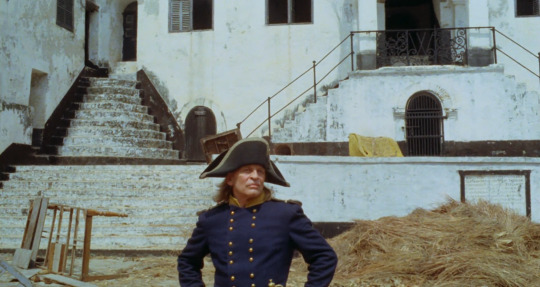
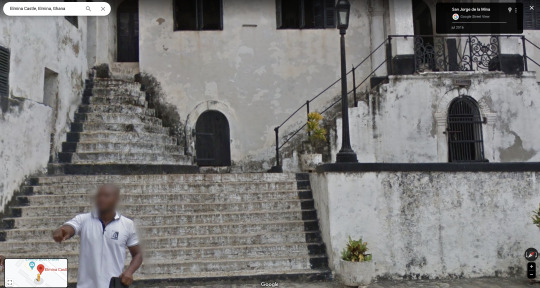


Cobra Verde Werner Herzog. 1987
Castle Elmina Castle, Elmina, Ghana See in map
See in imdb
#werner herzog#cobra verde#klaus kinski#elmina#fortress#castle#ghana#movie#cinema#film#location#google maps#street view#1987
8 notes
·
View notes
Text
https://www.threads.net/@bestghanatours

"The only limit to our realization of tomorrow is our doubts of today." – Franklin D. Roosevelt
#bestghanatours#tourism#ghana#travel#tour package#accra ghana#travelwithus#tourist#worldwide privacy tour#summer#all inclusive#cape coast#molenationalpark#tamale#larabanga#adventure#hiking#history#heritage#beyondthereturn#new york#united states#texas#elmina#castle#kakumcanopy#shaihills ghana bestghanatours tourpackage tour travel
0 notes
Text
Another Mention of Daendels Missing Remains..
May 2, 1818, at St. George del Mina. He was buried the following day in the governor’s grave just outside the castle. When his grave was opened in the twentieth century, his body was no longer present.
Holy shit it's actually real 💀 Yk I thought since I found the last passage on newspaper so I only took 95% of it srsly but now I found this in the actual book of Daendels; This is not a joke anymore. So in total there's currently 3 sources that talks abt this 😧
I know that human bones can dissolve (?) after a long time but considering that the tomb were opened in the 1900s, I don't think it should've completely gone by then. Now I started to doubt that Daendels was ever buried there at one point, what if it was js a lie/story that they made up? Oh n also; Daendels death certificate was only issued 4 YEARS after his death 🤨 What took them soo long?? 4 fucking years. If it's in months then it kinda make sense but 4 years nah, that's sus imo. I look on google n it said that death certificate should be issued shortly after doctor confirms one's death.
Lastly, I have a new theory; today I js read that there were once a "Grave Robbery" in the Dutch Cemetry Elmina, Ghana but idk when it is or anything else but what if this could be somehow connected to Daendels missing remains? Well I hope I can find smth more abt the incident. Anyway that's all for now, damn I need time to process this lol. Thank you n have a great day, stay safe 🌙
#now the question is; why n how they steal Daendels remains? if the “grave robbery” theory are true#i hope that theory is wrong#Daendels can't even rest in peace bruh#i need to stop theorizing weird stuff bcs I'm going insane lmao#daendels#history#dutch#dutch history#napoleonic era#governor general#gold coast#fan theory
9 notes
·
View notes
Text
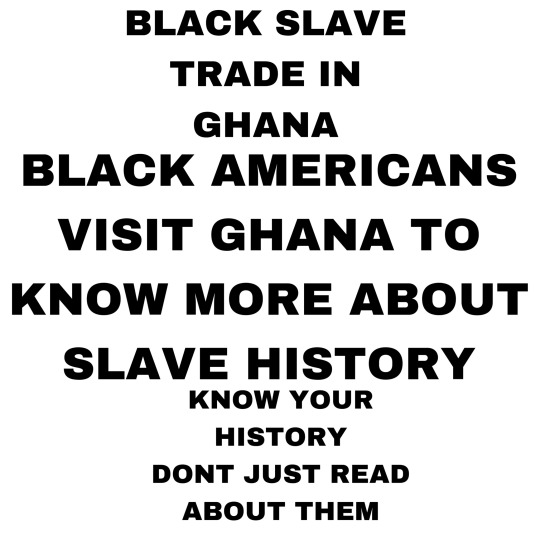
Black Americans should visit Ghana
To know more about black slave trade in Ghana
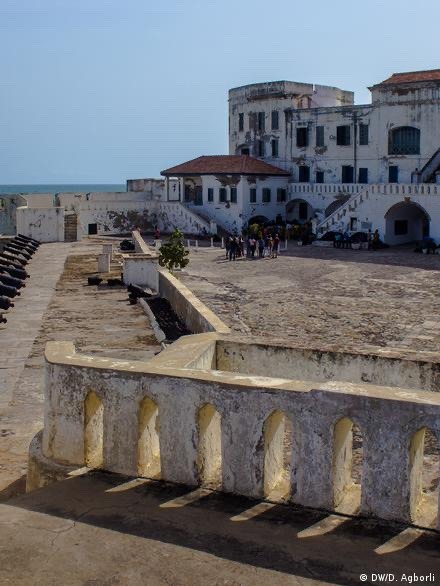
Monuments of shame
Cape Coast Castle - now a World Heritage Site - is one of about forty forts in Ghana where slaves from as far away as Burkina Faso and Niger were imprisoned. This former slave fortress could hold about 1,500 slaves at a time before they were loaded onto ships and sold into slavery in the New World in the Americas and the Caribbean.

Male captives who revolted or were deemed insubordinate ended up in the condemned cells - a pitch-black room where slaves were left to die in the oppressive heat without water, food or daylight.Rebellious women were beaten and chained to cannon balls in the courtyard
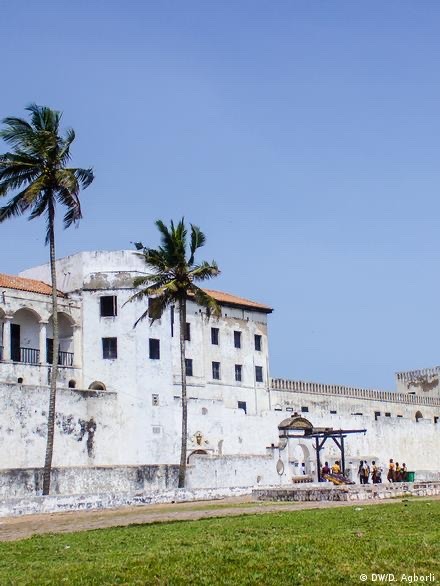
Built in 1482, Elmina Castle on Ghana's Cape coast is the earliest European structure erected in sub-Saharan Africa. Originally Portugese, it was later captured by the Dutch, who used it as a base for the Dutch slave trade with Brazil and the Caribbean. Under the flag of the Dutch West Indies Company, around 30,000 slaves a year passed through Elmina until 1814 when the Dutch abolished slavery.
The Portuguese position on the Gold Coast remained secure for almost a century. During that time, Lisbon leased the right to establish trading posts to individuals or companies that sought to align themselves with the local chiefs and to exchange trade goods both for rights to conduct commerce and for slaves whom the chiefs could provide. During the seventeenth and eighteenth centuries, adventurers--first Dutch, and later English, Danish, and Swedish-- were granted licenses by their governments to trade overseas. On the Gold Coast, these European competitors built fortified trading stations and challenged the Portuguese. Sometimes they were also drawn into conflicts with local inhabitants as Europeans developed commercial alliances with local chiefs.
The principal early struggle was between the Dutch and the Portuguese. With the loss of Elmina in 1642 to the Dutch, the Portuguese left the Gold Coast permanently. The next 150 years saw kaleidoscopic change and uncertainty, marked by local conflicts and diplomatic maneuvers, during which various European powers struggled to establish or to maintain a position of dominance in the profitable trade of the Gold Coast littoral. Forts were built, abandoned, attacked, captured, sold, and exchanged, and many sites were selected at one time or another for fortified positions by contending European nations.
Both the Dutch and the British formed companies to advance their African ventures and to protect their coastal establishments. The Dutch West India Company operated throughout most of the eighteenth century. The British African Company of Merchants, founded in 1750, was the successor to several earlier organizations of this type. These enterprises built and manned new installations as the companies pursued their trading activities and defended their respective jurisdictions with varying degrees of government backing. There were short-lived ventures by the Swedes and the Prussians. The Danes remained until 1850, when they withdrew from the Gold Coast. The British gained possession of all Dutch coastal forts by the last quarter of the nineteenth century, thus making them the dominant European power on the Gold Coast.
During the heyday of early European competition, slavery was an accepted social institution, and the slave trade overshadowed all other commercial activities on the West African coast. To be sure, slavery and slave trading were already firmly entrenched in many African societies before their contact with Europe. In most situations, men as well as women captured in local warfare became slaves. In general, however, slaves in African communities were often treated as junior members of the society with specific rights, and many were ultimately absorbed into their masters' families as full members. Given traditional methods of agricultural production in Africa, slavery in Africa was quite different from that which existed in the commercial plantation environments of the New World.
Another aspect of the impact of the trans-Atlantic slave trade on Africa concerns the role of African chiefs, Muslim traders, and merchant princes in the trade. Although there is no doubt that local rulers in West Africa engaged in slaving and received certain advantages from it, some scholars have challenged the premise that traditional chiefs in the vicinity of the Gold Coast engaged in wars of expansion for the sole purpose of acquiring slaves for the export market. In the case of Asante, for example, rulers of that kingdom are known to have supplied slaves to both Muslim traders in the north and to Europeans on the coast. Even so, the Asante waged war for purposes other than simply to secure slaves. They also fought to pacify territories that in theory were under Asante control, to exact tribute payments from subordinate kingdoms, and to secure access to trade routes--particularly those that connected the interior with the coast.
It is important to mention, however, that the supply of slaves to the Gold Coast was entirely in African hands. Although powerful traditional chiefs, such as the rulers of Asante, Fante, and Ahanta, were known to have engaged in the slave trade, individual African merchants such as John Kabes, John Konny, Thomas Ewusi, and a broker known only as Noi commanded large bands of armed men, many of them slaves, and engaged in various forms of commercial activities with the Europeans on the coast.
The volume of the slave trade in West Africa grew rapidly from its inception around 1500 to its peak in the eighteenth century. Philip Curtin, a leading authority on the African slave trade, estimates that roughly 6.3 million slaves were shipped from West Africa to North America and South America, about 4.5 million of that number between 1701 and 1810. Perhaps 5,000 a year were shipped from the Gold Coast alone. The demographic impact of the slave trade on West Africa was probably substantially greater than the number actually enslaved because a significant number of Africans perished during slaving raids or while in captivity awaiting transshipment. All nations with an interest in West Africa participated in the slave trade. Relations between the Europeans and the local populations were often strained, and distrust led to frequent clashes. Disease caused high losses among the Europeans engaged in the slave trade, but the profits realized from the trade continued to attract them.
The growth of anti-slavery sentiment among Europeans made slow progress against vested African and European interests that were reaping profits from the traffic. Although individual clergymen condemned the slave trade as early as the seventeenth century, major Christian denominations did little to further early efforts at abolition. The Quakers, however, publicly declared themselves against slavery as early as 1727. Later in the century, the Danes stopped trading in slaves; Sweden and the Netherlands soon followed.
The importation of slaves into the United States was outlawed in 1807. In the same year, Britain used its naval power and its diplomatic muscle to outlaw trade in slaves by its citizens and to begin a campaign to stop the international trade in slaves. These efforts, however, were not successful until the 1860s because of the continued demand for plantation labor in the New World.
Because it took decades to end the trade in slaves, some historians doubt that the humanitarian impulse inspired the abolitionist movement. According to historian Walter Rodney, for example, Europe abolished the trans-Atlantic slave trade only because its profitability was undermined by the Industrial Revolution. Rodney argues that mass unemployment caused by the new industrial machinery, the need for new raw materials, and European competition for markets for finished goods are the real factors that brought an end to the trade in human cargo and the beginning of competition for colonial territories in Africa. Other scholars, however, disagree with Rodney, arguing that humanitarian concerns as well as social and economic factors were instrumental in ending the African slave trade.
#life#culture#black history#blm blacklivesmatter#history#animals#architecture#aesthetic#black community#anime and manga#blacklivesmatter#humiliation slave
155 notes
·
View notes
Text
What do i think about when a country is mentioned or what do I associate it with
Algeria - Sahara desert
Angola - thumb pianos, Luanda being an incredibly expensive place to live
Benin - dahomey, voodoo
Botswana - diamonds and the fact that it has been called the success story of Africa
Burkina Faso - Ouagadougou formerly called upper volta.
Burundi - drums used during a revolution there. Gorillas
Cabo Verde - the shape of the country is like a ring of islands all around another island
Cameroon - soccer, limnically active lakes
Central African Republic - the French language
Chad - Lake Chad, Taureg People particularly the blue headscarves
Comoros - Anjouan Moheli and Grand Comore. Has had lots of coups
Congo DRC - my sister is into epidemiology so she talks about it a lot.
Congo - across a river from Brazzaville is Kinsasha
Cote d'Ivoire - Chocolate and the flag is the reverse of ireland
Djibouti - Lake Assal
Egypt - the pyramids
Equatorial Guinea - Spanish speaking, usually the country I use to explain why GDP per capita can be skewed.
Eritrea - architecture influenced by italy
Eswatini - I once got it confused with Switzerland, there's a holiday called Incwala
Ethiopia - a book I read a kid called "children just like me" also pizza hut, weddings, raw beef.
Gabon - oil and the fact that they have places called ogooue
Gambia - the shape and Yaya Jammeh
Ghana - also soccer, Elmina Castle
Guinea - One of the countries my sister knows a lot about
Guinea-Bissau - hippos
Kenya - Jeff
Lesotho - mountains
Liberia - my sister does a great impression of the I'm Liberian meme. Ebola, Ebola in town, don't touch your friend
Libya - Gaddafi, Has a much better flag now. A transit point in human smuggling.
Madagascar - vanilla
Malawi - perch
Mali - Houses built out of mud, west African Islamic architecture.
Mauritania - slavery, I watched a lot of videos during quarantine about modern day slavery.
Mauritius - hinduism
Morocco - markets and tangines
Mozambique - Cabo Delgado
Namibia - San People
Niger - The coup, the orange dot on the flag
Nigeria - Boko Haram
Rwanda - Rwandan Genocide
Sao Tome and Principe - water access for some reason
Senegal - I think this one YouTuber I watch is from there
Seychelles - Hetalia
Sierra Leone - Civil War
Somalia - it's shaped like a music note
South Africa - Vuvuzelas
South Sudan - Francis Bok
Sudan - There are more pyramids here than in Egypt
Tanzania - zanzibar
Togo - for here or Togo meme. I'm sorry Togo I know nothing about you
Tunisia - Arab spring
Uganda - Mr. Moseby
Zambia - the shape of the country reminds me of a fetus. There is also some really cool waterfalls I think, not sure.
Zimbabwe - Mugabe
9 notes
·
View notes
Text
1 note
·
View note
Text
Embark on a Journey to Discover Ghana: A Guide for the Diaspora
Ghana, known as the "Gateway to Africa," is a country rich in culture, history, and natural beauty. For many in the diaspora, visiting Ghana is more than just a vacation—it's a pilgrimage to reconnect with their roots and heritage. Whether you're exploring the bustling streets of Accra, delving into the poignant history of the Cape Coast, or immersing yourself in the vibrant festivals, Ghana offers an unparalleled experience. This guide aims to provide comprehensive insights and tips for those in the diaspora planning to embark on a journey to discover Ghana.
(A) Why Ghana?
1. Historical Significance
Ghana is steeped in history, particularly the history of the transatlantic slave trade. The Cape Coast and Elmina Castles are somber reminders of this dark past, serving as significant historical sites where many African Americans find a deep connection to their ancestry.
2. Cultural Heritage
Ghana's diverse ethnic groups, including the Ashanti, Ewe, Ga, and Fante, each have unique traditions, languages, and cultural practices. Festivals like Homowo, Aboakyir, and Hogbetsotso offer a window into these rich cultural traditions.
3. Welcoming Atmosphere
Ghana is known for its hospitality. The country's slogan, "Akwaaba," meaning "welcome," is not just a word but a way of life. The warmth and friendliness of the Ghanaian people make visitors feel at home instantly.
(B) Planning Your Trip
1. When to Visit
Though you can travel to Ghana all year round, but the best time to visit is during the dry seasons, from November to March and July to August. These periods offer the most favorable weather for travel and outdoor activities and depends on the part of the country you want to explore.
2. Travel Requirements
Ensure your passport is valid for at least six months beyond your intended stay. Most travelers will need a visa to enter Ghana, which can be obtained from Ghanaian embassies or consulates. Additionally, a yellow fever vaccination is required for entry.
3. Budgeting
Ghana is relatively affordable, but costs can vary. Plan your budget around accommodation, food, transportation, and activities. For a mid-range traveler, a daily budget of $50-$150 is reasonable.
(C) Must-Visit Destinations
1. Accra
Accra, the capital city, is the perfect starting point for your Ghanaian adventure. Visit landmarks like Independence Square, Kwame Nkrumah Mausoleum, and the bustling Makola Market. The city's vibrant nightlife, with hotspots like Osu and Labadi Beach, offers a mix of modernity and tradition.
2. Cape Coast and Elmina
These coastal towns are home to the infamous Cape Coast Castle and Elmina Castle, key sites in the history of the transatlantic slave trade. Guided tours provide in-depth historical insights and are deeply moving experiences for many in the diaspora.
3. Kumasi
Kumasi, the heart of the Ashanti region, is known for its rich culture and history. Visit the Manhyia Palace, the seat of the Ashanti Kingdom, and the bustling Kejetia Market. The Ashanti people’s traditional crafts, like Kente cloth weaving and wood carving, are also must-see attractions.
4. Volta Region
The Volta Region boasts lush landscapes and scenic beauty. Explore Wli Waterfalls, the highest in West Africa, and Mount Afadja, Ghana's highest peak. The region is also known for its vibrant Ewe culture and traditions.
5. Northern Ghana
The north offers a different cultural experience. Visit Mole National Park, Ghana's largest wildlife reserve, and the ancient mud-and-stick mosque in Larabanga. The cultural festivals and traditional dances in Tamale and Bolgatanga are also highlights.
(D) Cultural Etiquette
Understanding and respecting local customs and etiquette is crucial. Here are some tips:
- Greetings: Greet people with a smile and a handshake. Elders should be greeted first.
- Dress Code: Dress modestly, especially in rural areas and during visits to religious sites.
- Photography: Always ask for permission before taking photos of people.
- Language: While English is the official language, learning a few words in local languages like Dagbani, Gonja, Twi, Ewe, or Ga can go a long way in building rapport.
(E) Immersive Experiences
1. Participate in Festivals
Ghanaian festivals are vibrant, colorful, and full of life. Participating in these festivals offers an immersive cultural experience. Key festivals include:
- Homowo: Celebrated by the Ga people, it marks the end of the hunger period with feasting and dancing.
- Aboakyir: A deer-hunting festival by the Effutu people in Winneba.
- Hogbetsotso: Celebrated by the Anlo Ewe in the Volta Region, it commemorates their migration from Notsie in Togo.
(F) Learn Traditional Crafts
Engage in workshops to learn traditional crafts like Kente weaving, bead making, and pottery. These activities provide hands-on experiences and deeper appreciation for Ghanaian culture.
(G) Explore Local Cuisine
Ghanaian cuisine is diverse and flavorful. Must-try dishes include:
- Jollof Rice: A popular West African dish made with rice, tomatoes, and spices.
-Banku and Tilapia: Fermented corn and cassava dough served with grilled tilapia.
- Fufu and Light Soup: A staple dish made from pounded cassava or yams, served with a variety of soups.
(H) Connecting with the Community
1. Volunteering Opportunities
Many organizations in Ghana offer volunteering opportunities, ranging from education and healthcare to community development. Volunteering not only gives back to the community but also provides a unique way to connect with locals.
2. Ancestry and Heritage Tours
Several organizations offer specialized tours that focus on ancestry and heritage. These tours often include visits to historical sites, cultural exchanges, and opportunities to trace family roots.
(I) Practical Tips
1. Health and Safety
- Vaccinations: Ensure you're up-to-date on necessary vaccinations, including yellow fever, hepatitis A and B, typhoid, and malaria prophylaxis.
- Water: Drink bottled or filtered water to avoid waterborne diseases.
- Safety: While Ghana is generally safe, stay vigilant in crowded places and avoid traveling alone at night.
(J) Currency and Payments
The local currency is the Ghanaian Cedi (GHS). Credit and debit cards are accepted in major cities, but it's advisable to carry cash, especially in rural areas.
(K) Transportation
Transportation options in Ghana include taxis, tro-tros (shared minibuses), and buses. For long-distance travel, domestic flights are available. Ride-hailing apps like Uber and Bolt operate in Accra and other major cities.
Embarking on a journey to discover Ghana is a profound experience for many in the diaspora. From its rich history and vibrant culture to its welcoming people and breathtaking landscapes, Ghana offers a unique and transformative travel experience. By planning ahead, respecting local customs, and immersing yourself in the culture, you can create lasting memories and deepen your connection to this beautiful country. Whether it's your first visit or a return trip, Ghana's doors are always open, ready to welcome you with open arms. Akwaaba!
#africa#travel#larabanga#molenationalpark#ourjourneydoesnotendhere#ghana#africadairies#bestghanatours#wildlife#travelphotography#diaspora#history#cultural#heritage#explore#adventure#nature#wildlifephotography#new york city#city tour#tourpackage#allinclusivetourpackage#budget#luxury
5 notes
·
View notes
Text
Between trader and enslaved
Going Dutch in #Elmina, exhibition of paintings, 28 June – 2 July at the Haagse Kunstkring, Denneweg 64, The Hague. Free entrance.In each of the two corners of the courtyard of the slave castle in Elmina, below the governor’s chamber, there is a staircase in the shape of a giant cake. The enslaved who were kept below never entered the stairs. The merchants at the top counted the goods. DCF 1.0

View On WordPress
2 notes
·
View notes
Text
Elmina Castle: Painful Reminder of the Slave Trade
Fortress known as “Elmina Castle” is the oldest European fortress in Africa, dating back to 1482

Elmina Castle was built by the Portuguese in 1482, in what is now Ghana.
Originally designed to protect trade routes south of the Sahara, this fort would later become the world’s main hub for the transatlantic slave trade.
In the mid-15th century, Portugal expanded its influence throughout Africa, both through trade and through the spread of Christianity by missionaries.
The colonization of the African continent in the 1470's ultimately led them to the so-called “Gold Coast”. Here, the Portuguese would establish one of the first trading posts. This post would eventually be renamed to Elmina.

The direct translation from Portuguese is “Coast of the Gold Mine” (Por: “De Costa da el Mina de Ouro”).
Elmina’s economic success, as well as the infrastructural progress, soon transformed it into a formidable fortress and a slave distribution centre.
From here, slaves were sent to distant Brazil in order to strengthen Portuguese colonies in South America.
Multiple attempts to conquer Elmina have been made in the early 1600’s by British, French and Dutch colonizers.
However, the Dutch were the only ones who managed to overcome the Portuguese resistance, and in 1637 they took control of the fort.

By 1770, the Dutch had significantly altered the castle. From improved defences, heavier armaments and overall expansion, Elmina became a world trade centre for slavers. Many of whom competed on this marketplace in order to fetch the best prices possible and make a profit.
The conditions in which the slaves survived could not be described as anything other than appalling.
Up to 200 slaves, including women and children, would be held in small cells. There were no toilets, thus the imprisoned innocent were forced to defecate within the overpopulated cells.
Women were often taken to the castle governor to be raped and abused before being returned to their cells.

The castle today is a tourist destination and a painful reminder of the tragic history of the African continent and its people. It emphasizes one of the darkest periods of human history and the struggle of individuals for basic human rights and dignity.
0 notes
Text
Discover Ghana: 10 Breathtaking Places You Must Visit in Ghana! | Life Travel
https://expedia.com/affiliate/kBwO7hq
10 Most Beautiful Places to Visit in Ghana
🌍✨ Come along on an unforgettable journey through Ghana as we explore the 10 Most Beautiful Places to Visit! From breathtaking natural landscapes to vibrant cultural hubs, Ghana is a hidden gem in West Africa that’s just waiting to be discovered.
In this video, we’ll take you to stunning beaches, historic castles, lush national parks, and charming towns that showcase the rich heritage and beauty of this incredible country. Whether you're planning your next adventure or simply looking for travel inspiration, this video is your ultimate guide to the must-see spots in Ghana!
👉 Places Covered:
Kakum National Park
Cape Coast Castle
Busua Beach
Lake Volta
Aburi Botanical Gardens
Mole National Park
Elmina Castle
Nzulezo (the Water Village)
Boti Falls
Accra’s Arts Center
Don't forget to like, subscribe, and hit the bell icon for more amazing travel content! Share your favorite place in Ghana in the comments below!
📸 Follow us on Social Media:
https://www.tiktok.com/@lifetrevels @LifeTrevels
https://www.linkedin.com/company/lifetrevels/
0 notes
